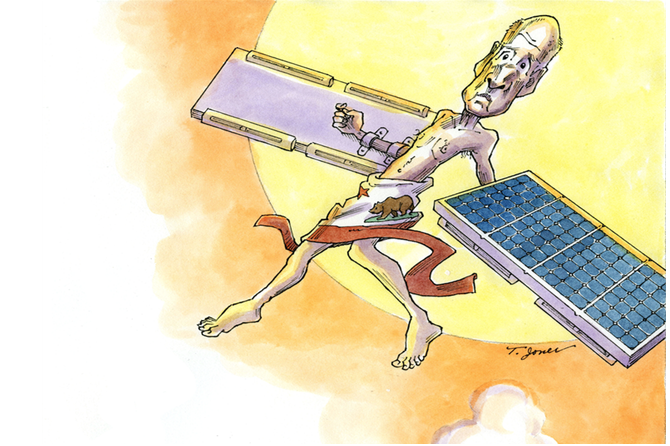CommentsCAL MATTERS--Don’t hold regular press conferences. Reward loyalty. If you’re a Californian with presidential aspirations, move to New York.
Are you taking notes, Gov-elect Gavin Newsom?
In the final days of his fourth and (presumably) final term as California’s chief executive, Gov. Jerry Brown spoke at the Sacramento Press Club, offering parting, and remarkably candid, tips on how to best govern the Golden State.
The hour-long conversation in the ballroom of the Sacramento Masonic Temple was moderated by Los Angeles Times columnist George Skelton and Miriam Pawel, author of the family biography, The Browns of California.
Brown, now 80, drew upon experience gleaned over 16 years as governor, plus job experience as attorney general, secretary of state, mayor of Oakland, and a three-time presidential candidate.
- Tip Number 1: “Avoid overexposure”
Pawel asked Brown if he had learned anything from his father, Pat, who served as the state’s governor between 1959 and 1967.
“One thing I learned was not have an open-ended press conference every week,” the governor said. The reason: reporters have the nasty habit of calling you out when you contradict yourself.
“It’s hard to be consistent in the face of an ever-complex, ever-unfolding story,” he said.
Sure enough, this was Brown’s first-ever visit to the state Capitol’s reporters club since returning to Sacramento as governor in 2011. But when Skelton asked whether the governor planned on commuting the sentences of any of the 739 people on death row in California, Brown made it clear that he was not there to provide fresh fodder to the reporters in the room.
“If I said something that would give you a story,” he said. “I’m not here to make news, I’m here to enlighten.”
- Tip Number 2: Don’t try to make everyone happy.
Ever since running for governor in 1974 on the promise to introduce an “era of limits,” Brown has cultivated a reputation as willing to buck his party’s big spending tendencies.
Apparently, there is political logic to being a budgetary tightwad.
“The idea that you’re going to make people happy and build a lot of support by doing a lot of stuff, frankly, it turns out that there’s a downside,” he said. “The more that you do, the more that people are empowered to demand that you do even more.”
- Tip Number 3: Do try to make some people happy
As a politician known for sprinkling Latin into his speeches, Brown paid tribute to the wisdom of the phrase quid pro quo.
“In politics, you should take care of your friends,” said Brown, noting that both Michael Picker, president of the California Public Utilities Commission, and Rose Bird, former chief justice of the California court system, started out working for his various campaigns. “Loyalty is important. Keep the meritocracy within limits.”
But there are limits on repaying loyalty too.
“Politics is a difficult business,” he said. “You need to raise massive sums of money from people who all want something and if you give it to them directly you’ll go to jail. But if you don’t give it to them in some form, you won’t be elected to the next office.”
“So you square that circle.”
- Tip Number 4: Don’t get distracted by ideological labels
Brown was Oakland’s mayor between 1999 and 2007. That stint taught him that just because someone claims to represent a particular viewpoint that you happen to share, that doesn’t mean that they have the best idea.
“People show up to city hall and argue for the stupidest things in the name of all good things,” he said. “Environment, labor, historic preservation, ethics, police accountability. Everybody’s got a good story.”
- Tip Number 5: If you’re running for president, don’t do it out of California
“Nixon paved the way” for Californians running for the White House, he said. “He moved to New York.”
With so many early primary states located on the east coast and the daily news starting three hours earlier, “proximity is a key issue that works against Californians.” That could change in 2020. Last year, California legislators voted to bump up the 2020 state primary to March 3rd.
Brown tackled other topics, all the while honoring his pledge not to say anything too newsworthy.
On the state’s high-speed rail, he assured Skelton that it will be built. “I think at our age we shouldn’t be driving,” he said.
On the recent court ruling out of Texas, which declared the entirety of the Affordable Care Act known as Obamacare to be unconstitutional, Brown said that he was “not really worried about it,” confident that the ruling will be overturned. And if it isn’t, there will be electoral hell to pay for the Republicans, he said, allowing Democrats to replace Obamacare with “something even better.”
On his imminent departure from elected office, he said that he will miss the constant activity that comes with the job.
“I like sparring with the press, I like raising money, I like attacking my opponents, I like being attacked by my opponents,” he said.
But come January 7, he will be giving that all up and heading up to his ranch in Colusa County, where he said he’ll have to deal with “real rattlesnakes.”
(Ben Christopher writes for Cal Matters … where this piece was first posted.)
-cw
















